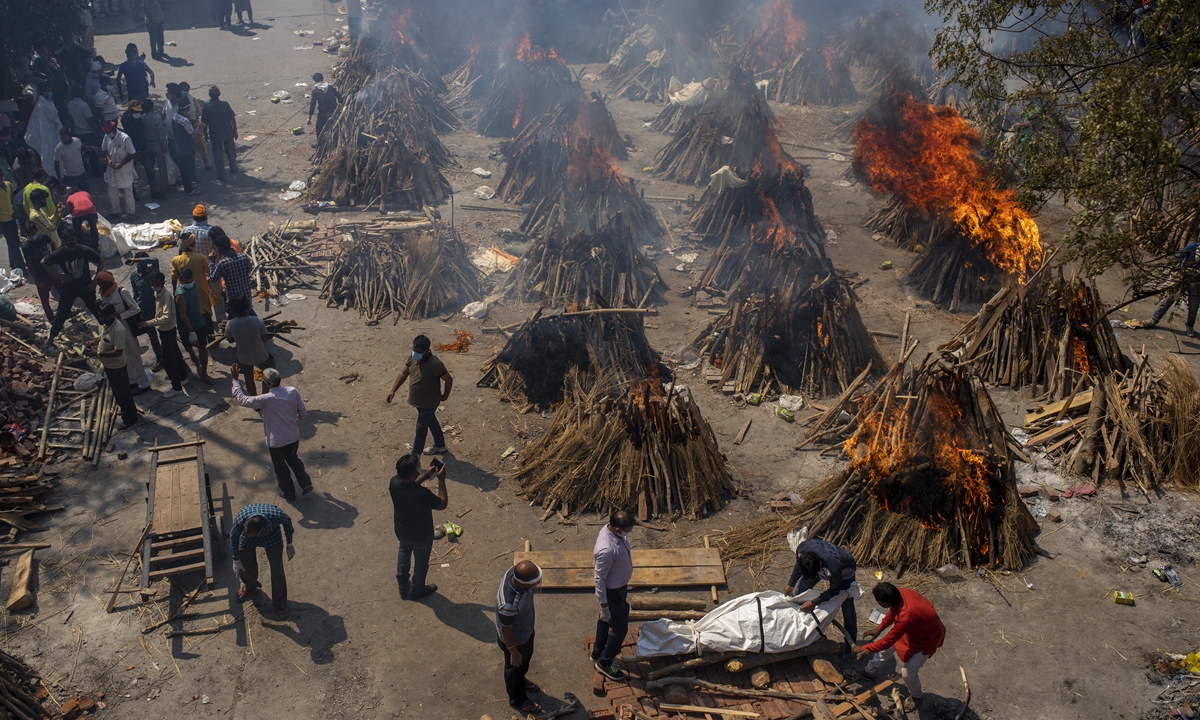
Multiple funeral pyres of COVID-19 victims burn at a site converted for mass cremations in New Delhi, India on Saturday. Indian authorities are scrambling to get medical oxygen to hospitals when the country reported a new global daily record of more than 346,000 infections for a third straight day. Photo: AP
Under great pressure from international public opinion, US President Joe Biden said on Monday the US is determined to "help" India. It's reported that more than 300 oxygen concentrators have been dispatched from New York on Sunday morning and are supposed to arrive in New Delhi on Monday. This was in sharp contrast with the US' negative attitude toward assisting India until last week.
US allies including the UK, France, and Germany also announced to offer assistance to India on Sunday, which left people with an impression that Washington has coordinated with them.
Many Indians are complaining that the US aid comes way too late and is more of symbolic significance. Several hundred oxygen concentrators are inadequate for India. What the country needs now are tens of thousands, or even hundreds of thousands. The US will immediately deploy supplies and other assistance, including raw materials for COVID-19 vaccine, to India, the White House said, following a Sunday call between US National Security Advisor Jake Sullivan and his Indian counterpart Ajit Doval. But the US will still have reservations over the quantity of material exports, and the implementation process will face challenges.
Biden's approval rating stands at only 52 percent after almost 100 days in office, the third-lowest since tracking began in 1945, following Donald Trump and Gerald Ford. Biden is facing enormous pressure from the Republicans and some Democrats. "America First" has been deeply embedded into the values of the US and has become a red line that Biden dares not touch.
There are two reasons for the US' strategic selfishness. First, this is the inherent nature of the US system, which is prone to amplify individual selfishness rather than restrain and counterbalance such selfishness. Second, the US has become relatively weak, and it cannot meet its "leadership role." India is a country with an enormous population. In the long run, it will cost US much more to "lead" India than any of its other allies.
One unhealthy aspect of the global anti-pandemic fight is that science and humanitarian logic have failed to truly dominate the fight on the international stage. Geopolitical thinking has never been away from the fight. It has disrupted the pandemic fight from time to time, and even managed to play a dominating role at some moments. India has been struggling in a critical situation, but geopolitical clues are still evident in its epidemic-related information. This is regrettable. COVID-19 patients are dying in batches, but some people are still debating which country's assistance India should take and what it would mean for international relations in future.
Whatever happens, we hope India could curb its epidemic as soon as possible. Mankind is a community with a shared future when it comes to the fight against the pandemic. As India is a large country¸ the raging epidemic in India inevitably means increasing risks for other countries and regions. How India can realize a soft landing with a lower death toll will offer useful experience for other developing countries.
The new coronavirus variant detected in India seems to be able to ferociously spread with the approach of summer, which requires higher international vigilance. India's tsunami-like COVID-19 wave warns us that fighting the coronavirus pandemic is a long-term "world war" and many unexpected new battlefields and new battles may await us. We can never let our guard down.
Countries with a strong capability to resist COVID-19 have to assume greater responsibility. It is vital that the US joins them. The US has made little positive contribution to the global fight against the pandemic. Lending a helping hand to India can be seen as the first US attempt to play such a role. We hope it will be Washington's turning point. The US has gravely dragged the global fight against the pandemic, and it is supposed to proactively make up for it.
Since last year, the novel coronavirus pandemic has hit many countries and regions in the world, resulting in unbelievable deaths and economic losses. But some countries are still building their national security in traditional ways. This is a strategic mistake, at least to some extent. Washington has played a misleading role in this regard. In other words, if the US is drunk, many other countries may not be able to remain sober.




